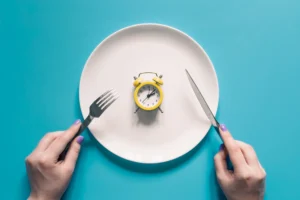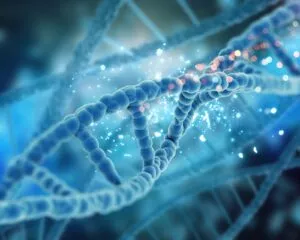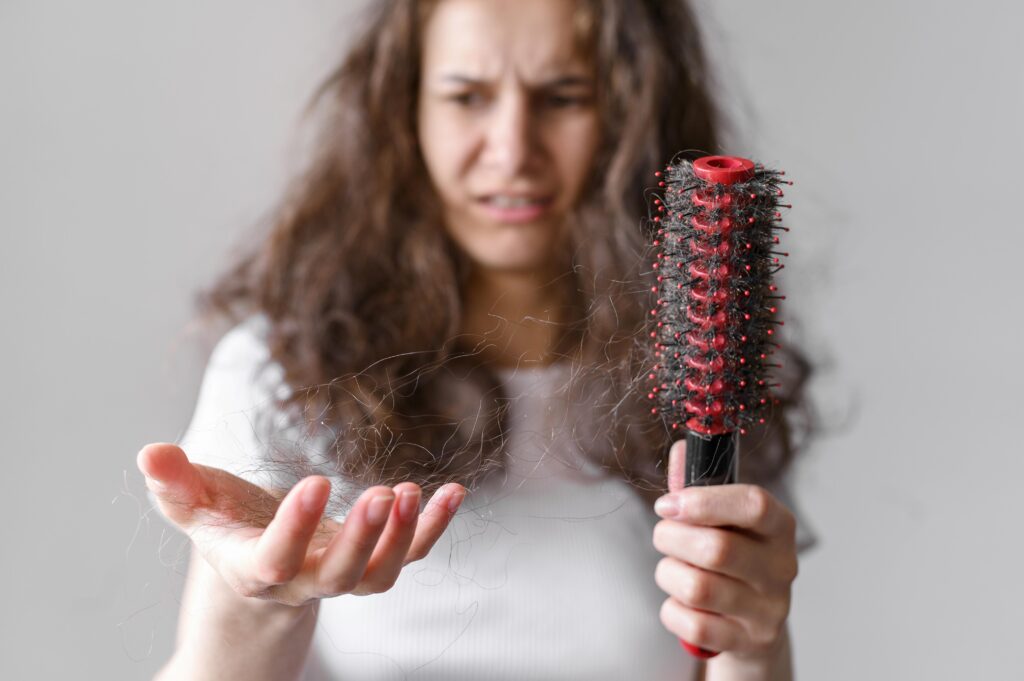
Can reversing the PCOS grow back the hair?
The approach toward managing PCOS should include:
- Enhancing insulin sensitivity and reducing the levels of the high circulating insulin (hyperinsulinemia) as Insulin along with Leutinizing hormone(LH) makes more testosterone. One can do so by following a proper diet regimen. The proper diet should be high in fiber and should include low-carb sources(mostly complex), high protein, moderate fat (omega 3s, MUFAs), and an adequate amount of water intake. Foods high in sugar, salt, saturated, and transfat, processed and packaged foods are highly discouraged as they may aggravate and worsen hair loss.
- Losing weight– Reducing weight has been shown to improve insulin resistance and indirectly the androgen excess in the body. The focus should not be only on reducing the overall calorie consumption but one must also increase Fiber (whole fruits, salads, whole cereals, pulses, seeds, etc.), Protein (pulses and legumes, soybeans, tofu, egg, meat, dairy products like curd, paneer, etc.), complex carbs (whole cereals, millets, lentils, beans, green leafy vegetables, etc.), and good fats like omega 3 fatty acids (walnuts, flaxseeds, fatty fish) and MUFA (avocados, groundnuts, olive oil, etc.)
- Including at least 45- 60 min of low to moderate-intensity of exercise. It will also enhance insulin sensitivity, reduce hyperinsulinemia, and thereby will promote hair growth.
- Stress management– Chronic stress has been shown to lead the hair loss. Research has proven that stress increases the production of androgens in the body which can trigger hair loss.
- Including the foods like apple cider vinegar, ghee, and cinnamon that would also help improve the sensitivity.
- Moreover, one can also include a few functional foods like Fenugreek seeds, drumstick leaves, guava leaves, jamun seeds powder, Ashwagandha, and Turmeric which would help manage Insulin Resistance.
Other ways to manage hair loss are:
- Drug therapy like Metformin, OCPs (Oral contraceptive pills), and Oral antiandrogens.
- Hair transplant
- Low-dose laser treatments.
- Platelet-rich plasma treatment.
Follow on Instagram to stay updated with my healthy plates!

Here are some other Blogs that you should check

Foods to increase the breast milk
Breastfeeding is an extremely crucial period for both mother and baby. It provides the baby with essential nutrients and antibodies while helping the mother bond

How to improve Hemoglobin during Pregnancy
Pregnancy is a time of profound change in a woman’s body, with various physiological adjustments necessary to support the growing fetus. One crucial aspect of

Top 10 Mistakes in Weight Loss and Intermittent Fasting.
There is a lot of talk about Intermittent fasting these days. Intermittent fasting has become a popular and effective strategy for many people aiming to

How to Balance Hormones for Weight loss
When it comes to weight loss, most people often focus on diet and exercise. They meticulously count calories, track macros, and spend hours at the

Difference between PCOS & PCOD
Polycystic Ovarian Syndrome (PCOS) and Polycystic Ovary Disease (PCOD) are two terms often used interchangeably, but they represent distinct conditions with unique characteristics. While they

Role of Antioxidants in Gut Health
In our body’s complex system, the gut plays a central role in orchestrating various functions essential for overall health. Recent breakthroughs in scientific research have

